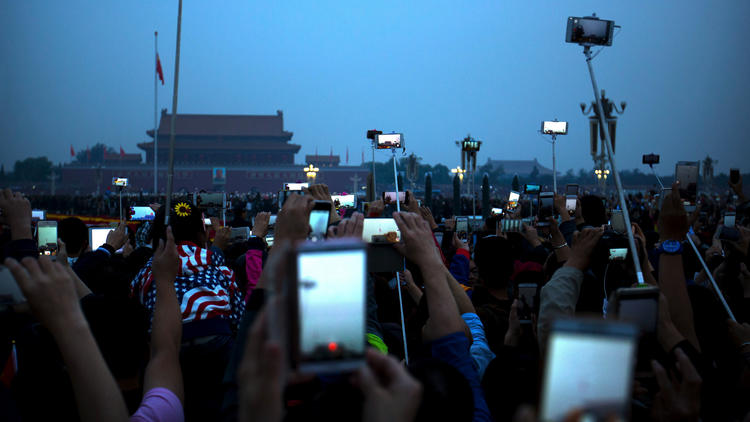Media Report

- The LA Times reports: "A vast swath of the Chinese public sees the U.S. as 'a top threat,' worse than climate change or Islamic State, according to an independent public opinion survey published Wednesday....Chinese citizens see their country's role in the world expanding, according to the report — 75% of respondents believe that 'China plays a more important role' in global affairs than a decade ago. Yet Chinese are warier of foreign influence, with 77% responding that their 'way of life needs to be protected against foreign influence,' up 13% from 2002. Just under half of respondents said 'the U.S. is a major threat,' according to the report, marking 'the highest percentage among the seven potential threats tested on the survey.' (The other threats include global economic instability, climate change, cyberattacks, and Islamic State.)...'There's this combination of self-confidence, and at the same time, real wariness,' [said Bruce Stokes, director of Global Economic Attitudes at the Pew Research Center and one of the report's authors], 'I can't explain that, but it seems it's something we need to pay attention to — because there's an unease there.'"
- The Economist comments: "Research by Tom Chang of the University of Southern California and colleagues found that pear packers working indoors were slowed by air pollution even at levels well below current air-quality standards. Might sedentary office workers indoors, also be slowed down by poor air quality? In a second paper, Mr Chang and his colleagues studied China, where air pollution is a major problem....What they find isn't good. On days with higher air pollution, workers spend more time on breaks and complete fewer calls. On average, a 10% increase in the API was associated with a 0.35% decrease in number of calls handled per day. That quickly adds up: workers in the call centres studied are estimated to be 6% more productive on low-pollution days than on days when pollution is high....Activity in the service sector, much of which happens in offices in polluted cities, accounts for 68.5% of global GDP. Mr Chang and his colleagues reckon that a reduction in China's air pollution index by just 10 points could boost worker output in China by at least 15 billion yuan ($2.2 billion) per year. The damaging effects of particulate matter on productivity may also be larger in more cognitively demanding professions—suggesting the benefits of reduced air pollution could be greater still."
- The New York Times reports: "The Chinese president, Xi Jinping, appears prepared to defy the Communist Party's established script for transferring power and delay the designation of his successor until after a party congress next year, unsettling the party elite and stirring speculation that he wants to prolong his tenure....Although Mr. Xi's decision will not be known until late 2017, the suggestion that he intends to break with precedent and begin his second term without a probable successor is magnifying uncertainties about who will rise and who will fall in the expected shake-up, including questions about the fate of the premier, Li Keqiang. 'It's a very delicate issue,' said a member of the party establishment who regularly speaks with senior officials....'I don't think Xi wants to decide until the people he favors have more experience, more testing,' he said."
Calendar
- 2016-10-04 For China, ‘Clouds Are Fading Away’ in the Philippines
- 2016-10-03 China Eyes Ending Western Grip on Top U.N. Jobs With Greater Control Over Blue Helmets
- 2016-10-02 China Factory Gauge at 2-Year High Eases Pressure for Stimulus
- 2016-09-30 China’s New Silk Road Hinges on a Small Pakistan Port
- 2016-09-29 How to Fix China’s Crooked Congress
- 2016-09-28 China’s Ambitious Plan to Make the Yuan the World’s Go-To Currency
- 2016-09-27 U.S. Says Chinese Executive Helped North Korea Dodge Sanctions
- 2016-09-26 Hong Kong and the Realities of China’s Rise
- 2016-09-23 China spends more in the world than the world spends in China
- 2016-09-22 Foreign Reporters in China Face More Restrictions Now, Report Says
News
- The LA Times Many in China see the U.S. as a greater threat than Islamic State, new report says
- The New York Times Xi Jinping May Delay Picking China's Next Leader, Stoking Speculation
- The Washington Post 16 now confirmed dead in China landslides following typhoon
- The Wall Street Journal China Can't Make Taiwan 'Bow to Pressure,' Island's Leader Says
- CNBC Thai authorities detain Hong Kong activist Joshua Wong at China's request
- Bloomberg Business U.S., China Said to Discuss Choking Off North Korea Energy
- Reuters UPDATE 1-China's southern megacities roll out measures to cool property market
- The Wall Street Journal Blackstone to Sell IT Outsourcing Firm in China for $675 Million
- The Washington Post Chinese hit ballet 'Raise the Red Lantern' goes to Manila
- Bloomberg Business Goldman Sounds a Warning on China Property, Outlook for Metals
- Reuters Thailand bars entry to teenage HK activist 'at China's request'
- The New York Times Murray Sets Up China Open Quarterfinal vs British Teammate
- The Guardian Chinese people see US as 'top threat' to their country, poll shows
Commentary
- The Economist How air pollution affects office workers—and the economy
- The New York Times: Sinosphere Half of Chinese Favorable Toward U.S., but Many See a Threat, Survey Finds
- The Washington Post: Monkey Cage Read this book if you want to know what China's citizens really think about their government
- The Diplomat Does China Really Want a 'Just and Fair' International Order?
- The New York Times: Sinosphere As China Strikes Deals, U.S. Considers Expanding Foreign Reviews
- The Wall Street Journal Taiwanese President Tsai: Taiwan Won't Succumb to China's Pressure
- The Diplomat China's Experiment in Djibouti
